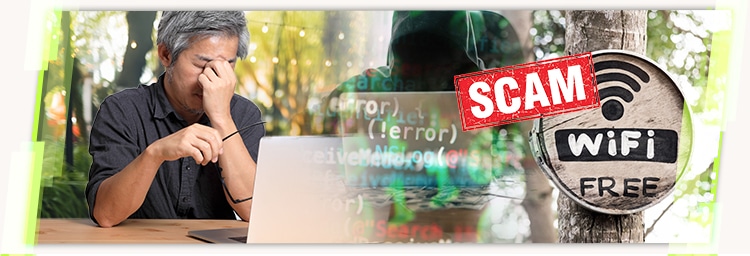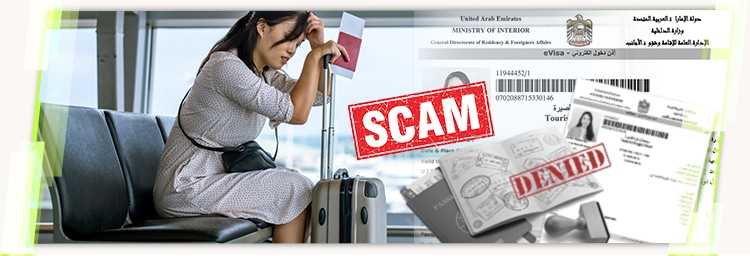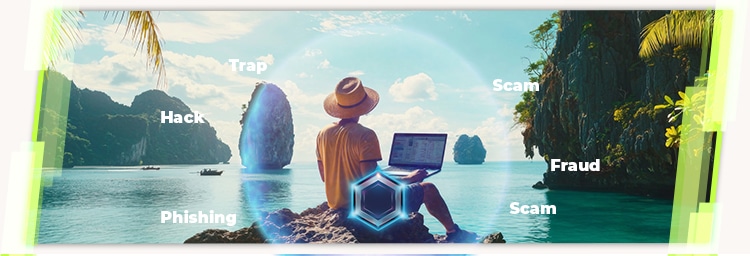Introduction
Want to travel the world? You can do that as a digital nomad!
Digital nomads can work from anywhere that has a strong internet connection, allowing them to travel freely while earning an income.
They can be freelancers, entrepreneurs, or remote employees working in industries like IT, marketing, writing, design, and more.
For most people, the easiest way might be to get online jobs.
With more online opportunities available, many countries now offer special digital nomad visas and incentives, making it easier for nomads to live, work legally, and support the local economy wherever they deem fit.
You can also check out these affordable countries where Filipinos can easily become digital nomads.
However, it’s not always fun and games because many scammers also target digital nomads.
Why Scammers Target Digital Nomads
As digital nomads grow in number, so do many scammers looking to make a quick buck. Here’s why.
Constant movement and lack of familiarity with local environments.
Many digital nomads lack the time and resources to learn about local customs, laws, and reliable services because they are busy adjusting to new places, getting work done, and exploring.
This makes them more vulnerable to travel scams since they’re less attuned to potential risks in their surroundings.
Heavy reliance on online platforms for work, accommodations, and transactions.
Digital nomads heavily rely on online platforms to get around, and this makes them more vulnerable to online threats.
Scammers can easily create fake job listings, fraudulent rental ads, or shady payment requests.
Furthermore, the convenience of online transactions can cause nomads to overlook important security measures, making them more vulnerable to phishing attacks and identity theft.
Now, let’s discuss the most common digital nomad scams.
Top 10 Scams Digital Nomads Should Look Out For
If you’re going to YOLO, do so responsibly by keeping an eye out for the digital nomad scams:
1. Fake Rental Listings
Many digital nomads stay in one place for extended periods, sometimes even months.
As a result, renting a property is often more affordable than staying in a hotel, which is why some scammers take advantage of this by posting fake rental listings.
Scammers posting non-existent or occupied properties.
Scammers often use appealing images and low prices, only for victims to discover that the listing is either fake or already off the market.
They then request deposits upfront and then go MIA, leaving unsuspecting digital nomads without accommodation and out of pocket.
Tips for verifying listings and avoiding payment traps.
Here’s how you can steer clear of these digital nomad scams:
Research the Property
Look up the property address online to see if it appears on other rental websites. Finding the same listing on multiple sites can indicate its legitimacy.
Additionally, check for reviews or testimonials from previous lessees on platforms like Google Maps to gather feedback about the property.
Verify Ownership
Ask to communicate directly with the property owner or manager.
Request proof of ownership, such as a property deed or a recent utility bill in their name.
Avoid Giving Payments Upfront
Be cautious of listings that demand large deposits or full payments upfront before you’ve even seen the property.
Furthermore, use secure payment platforms that offer buyer protection rather than wiring money directly to the landlord.
Request a Video Tour
If possible, ask for a live video tour of the property to verify its existence and condition.
Use Trusted Platforms
Stick to reputable rental websites that have verification processes in place to reduce the risk of scams.
Get Everything in Writing
Ensure that any agreements are documented, including terms of rental, payment details, and cancellation policies.
2. Remote Job Scams
Many scammers create fake job listings that promise remote work opportunities – only to steal personal information or money.
Fake job offers that require payments upfront.
Scammers create enticing job listings that promise remote work, flexible hours, and high pay.
Once you express interest, the scammer asks for upfront fees for things like training, equipment, or job placement, claiming it’s part of the hiring process.
After the payment is made, the scammer vanishes, leaving you without a job -or any way to get your money back.
How to identify legitimate job offers.
Fortunately, there are telltale signs of these scams to watch out for.
Legitimate employers typically won’t ask for payments, and there should be no vagaries about the nature of the job offered.
When in doubt, look up the company online and verify the job posting on their official website. Steer clear of offers that seem too good to be true or lack detailed information about the role and company.
Also, you can check these common work-from-home red flags to spot potential scams.
3. Public Wi-Fi Hacks
Digital nomads often rely on open public networks in places like cafes, airports, and coworking spaces.
However, this makes them easy targets for hackers who exploit unsecured Wi-Fi to steal sensitive information, such as passwords and bank details.
Cybercriminals stealing sensitive information via unsecured Wi-Fi networks.
Unscrupulous individuals can hack into these networks to intercept data being sent.
This means that they can easily capture your passwords, bank information, or personal details if you key these in while connected to public wi-fi.
How to protect yourself online.
Avoid accessing sensitive information or making financial transactions on public Wi-Fi; instead, use a private mobile data connection whenever possible.
Additionally, consider using a Virtual Private Network (VPN) to encrypt your internet connection, which makes it harder for hackers to access your data on public networks.
Finally, secure your devices by keeping them updated with the latest security patches and using strong, unique passwords for each account. Enabling two-factor authentication (2FA) can also provide extra protection.
You can also check these cyber security tips for remote workers for added security.
4. Fake Visa and Work Permit Services
Scammers often target digital nomads by offering fake visa and work permit services, promising quick and easy approvals online.
Scammers promising fast visa processing for high fees.
This is particularly common in countries with complicated visa requirements or challenging legal work permits, which makes travelers more susceptible to scams.
Scammers often promise fast visa processing for high fees, claiming to expedite the application in exchange for significant payments.
However, victims frequently discover that their applications are either never submitted or are issued fake or invalid documents, putting them at risk for legal troubles and financial loss.
How to avoid being scammed when applying for visas.
Always refer to official government websites for information and applications, and avoid third-party services unless they have the necessary certifications and are verified.
Additionally, be wary of unsolicited visa processing offers, as legitimate agencies do not randomly reach out to individuals.
It’s also important to read the fine print for any hidden fees and to consult fellow travelers or digital nomads for insights on trustworthy services.
By following these tips, you can significantly reduce your risk of falling victim to visa scams.
5. Freelance Payment Fraud
Scammers may pose as clients, offering freelance work, leaving their victims holding an empty bag in the end.
Clients disappearing without paying for completed work.
It can start as a seemingly legitimate project, sometimes even with an agreement in writing.
The client may provide detailed instructions and timelines, building trust over time.
However, once you submit the completed work, the client suddenly stops responding to messages, ignores payment requests, or deletes their account – leaving you without compensation.
How to ensure payment security.
Always insist on a contract that outlines the output agreed upon, payment terms, and deadlines.
Requesting an initial payment up front or even implementing staggered billing is also a good idea, especially for larger projects.
You can also work with trusted agencies like Remote Staff, which offer a compensation guarantee – even if the client goes MIA.
6. Phishing Emails and Scams
Digital nomads often rely on email for communication and transactions, making them more vulnerable to phishing scams.
Scammers send fake emails pretending to be clients, employers, or trusted services, tricking them into providing sensitive information like passwords or bank details.
Fraudulent emails designed to steal your information.
You might receive what appear to be legitimate emails from trusted sources, such as banks, clients, or payment platforms, asking you to click on a link or provide personal details.
Once you click, you’re directed to a fake website that captures your login credentials or financial information.
Tips to avoid phishing schemes.
Here are some digital security tips to avoid falling prey to phishing:
Verify the Sender
Always check the sender’s email address for spelling errors or unusual domains that may indicate a fake email.
For example, if you receive an email supposedly from PayPal, but the sender’s address is something like “support@paypa1.com” (with a “1” instead of an “l”), it’s likely a phishing attempt.
Always compare the email address against the official contact information on the company’s website before taking any action.
Avoid Clicking Links
Instead of clicking on links in emails, manually type the URL of the website in your browser to ensure you’re visiting the legitimate site.
Look for Red Flags
Be cautious of urgent language, grammar mistakes, or generic greetings like “Dear Customer” instead of your name, as these can indicate a phishing attempt.
Use Two-Factor Authentication (2FA)
Enable 2FA on your accounts for an additional layer of security, making it harder for scammers to access your information even if they have your password.
Keep Software Updated
Ensure your devices and security software are updated to protect against the latest threats.
By following these tips, you can significantly reduce your risk of falling victim to phishing schemes.
7. Tourist Traps
Digital nomads in new surroundings can easily fall for tourist traps that target unsuspecting travelers.
Locals or businesses charging digital nomads inflated prices.
Locals or businesses may see digital nomads as easy targets, thus raising prices for services, accommodations, or food in areas they might frequent.
How to avoid being overcharged as a tourist.
Follow these tips to lessen your chances of getting victimized by tourist overcharges and traps:
Research Prices
Before you arrive, look up the standard prices for accommodations, meals, and activities in the area so you have a reliable benchmark.
Ask Locals
Ask locals or fellow travelers who’ve already been to the area for recommendations on where to eat and stay.
Negotiate
In many cultures, it’s acceptable to negotiate prices, especially for accommodations or certain market goods, so don’t hesitate to ask for a better rate.
Be Cautious with Tours
When booking tours, choose reputable companies with good reviews to avoid overpriced or low-quality experiences.
By following these tips, you can make your budget go further without compromising the quality as you travel.
8. Tech Support Scams
Scammers typically pose as legitimate tech support representatives from well-known companies, claiming there are issues with the user’s device or account.
Scammers offering fake tech support to gain access to your device.
Scammers often contact you through pop-up ads, emails, or calls, claiming your device has a problem to trick you into giving them remote access.
Once in, they steal data or install harmful software, then demand payment in return for your data back or the solution to whatever virus they’ve installed.
How to recognize and avoid tech support scams.
Be wary of unexpected pop-ups, emails, or calls about supposed issues with your device. Legitimate companies typically don’t contact users this way.
Avoid clicking on unfamiliar links or dialing/answering unknown numbers, and always confirm any issues by reaching out directly to the company through their official website or customer service hotline.
Lastly, never grant remote access to your devices.
9. Fake Investment Opportunities
Many digital nomads seek passive sources of income to fund their travels, making them prime targets for investment scammers.
Scammers promising high returns on fake investments.
Scammers often promise high returns on fake investments, such as cryptocurrency ventures or real estate projects that don’t exist.
They lure digital nomads with enticing advertisements or social media posts, claiming that their investments can generate significant profits with little risk.
Once a digital nomad invests, they may discover the opportunity was fake, leading to financial losses -and no chance to get their money back.
How to avoid investment scams.
Conduct thorough research before committing your money.
Look out for red flags, such as promises of high returns with little risk, or shady pressure to invest quickly.
Always verify whether the company or individual is registered with the appropriate financial authorities.
If you have doubts, consult a financial advisor and refrain from sharing personal or financial information with unknown parties.
Lastly, remember to trust your instincts—if an investment seems too good to be true, it probably is.
10. Online Course and Certification Scams
Most digital nomads seek online courses and certifications to improve their skills and find better job opportunities or boost income.
This makes them easy targets for online course scams .
Fraudulent courses offering worthless certifications.
Scammers create fraudulent websites or ads promoting online courses that promise valuable certifications.
They often use convincing marketing tactics, such as fake testimonials or partnerships with well-known organizations, to appear legitimate.
After digital nomads pay for the course, they end up with poor-quality content, if anything at all- and any certification they receive turns out to be bogus or useless.
How to verify legitimate online courses.
Check if the provider is accredited or recognized by trusted institutions.
For instance, for digital marketing courses, seek out well-known platforms like Coursera or edX, or courses from established universities.
If the provider is less familiar, look into their partnerships with recognized organizations to confirm their legitimacy.
You can also find valuable courses on Udemy. They might not all offer a certification at the end of the course, but they still provide practical knowledge.
Additionally, be sure to read student reviews, research the platform’s reputation, and verify the instructor’s credentials.
Finally, be wary of courses that promise unrealistic results or require high fees upfront.
Additional Tips for Staying Safe as a Digital Nomad
Aside from the scams you need to watch out for, here are some additional tips to enjoy safe adventures.
Protect Your Digital Identity
With the rise of digital nomad scams and cyber security attacks, take measures to safeguard your digital identity.
Use strong, unique passwords for all your accounts and consider using a password manager to help you lock them down.
Additionally, enable two-factor authentication (2FA) wherever possible for an extra layer of security.
Be cautious when sharing personal information online and regularly monitor your accounts for any suspicious activity.
Choose Your Online Tools Wisely
When choosing online tools, prioritize those that are secure and protect your privacy.
Check user reviews and security features for online tools. Select services with end-to-end encryption for communication and file storage.
Be wary of free tools, as they might sell your data or have less security.
Travel with Essential Security Gear
RFID-blocking wallets or sleeves protect your passport and credit cards from unauthorized scanning.
Additionally, keep an Emergency Contact Card handy; it should include important information such as emergency contacts, local embassy details, and health insurance information, which can be invaluable during emergencies.
Finally, always have a copy of your Travel Insurance Policy Document on hand.
This will help you understand your coverage and provide you with the necessary information if you need to file a claim or seek assistance.
FAQS
Let’s go over a few more queries to cover all our bases.
What should I do if I encounter a scam while traveling?
Stay calm and immediately disengage from the scammer. Document the incident and report it to local authorities and your embassy.
What’s the best way to handle payments while traveling in foreign countries?
Carry some local currency for small purchases and tips, and use a credit or debit card with low or no foreign transaction fees for larger expenses to avoid digital nomad scams.
Also, keep your payment methods secure and regularly check your accounts for any unauthorized charges.
How can I manage my work-life balance as a digital nomad while staying safe?
Create a routine that includes set work hours and personal time to prevent burnout.
Choose safe and comfortable places to work, and use reliable tools to protect your digital information.
Lastly, make self-care a priority and stay connected with friends or family for support, helping you maintain both well-being and productivity while traveling.
With the tips above, you can avoid digital nomad scams and stay productive as a digital nomad
However, if you’re still looking for opportunities to work online, you can sign up with Remote Staff for the best remote working opportunities for Filipinos.
Start your digital nomad journey by connecting with our remote clients offering flexible job opportunities that match your skills.
Register today!














